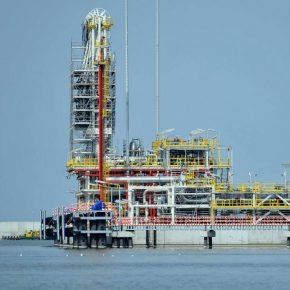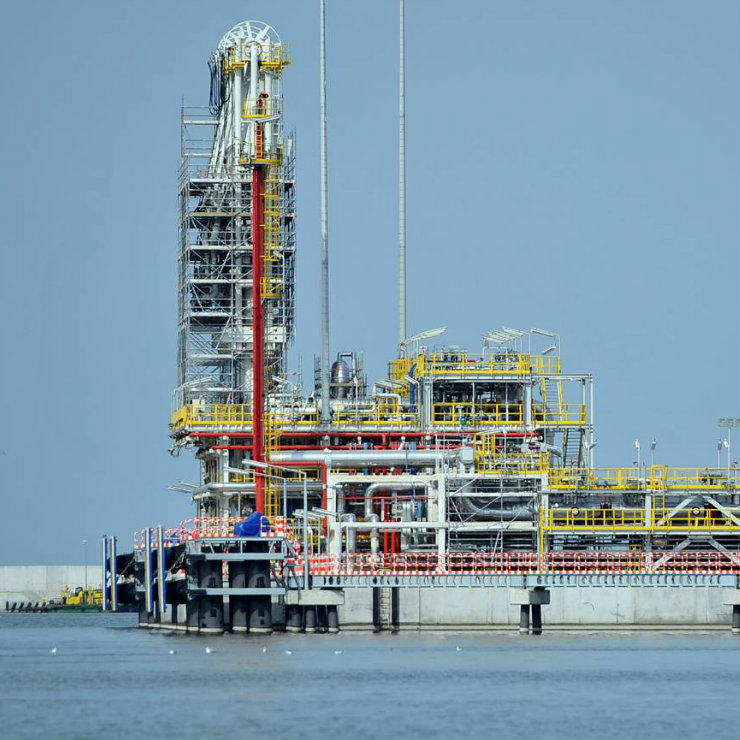Tydzień w gospodarce
Category: Raporty

LNG terminal, Świnoujście, Poland (©PAP)
CE Financial Observer: The first delivery of LNG from Qatar has arrived at the terminal in Świnoujście. Was this event a beginning of diversification?
Krzysztof Księżopolski: This was an important event, although it happened a couple of years too late. The LNG terminal alone will guarantee our independence from Russia because it only allows us to import 5 bcm of gas per year, with a consumption level of 16.3 billion cubic meters (bcm) and imports of 10.6 bcm. We need further steps – the expansion of the LNG terminal to 7.5 bcm, and the construction of the Baltic Pipe, i.e. a gas pipeline to the Norwegian deposits. In my opinion, the Baltic Pipe should have a capacity of 22 bcm. Then it would be an adequate answer to Nord Stream II and the Russian desire to divide the European Union.
Wouldn’t that be a bit excessive? 22 bcm from the Baltic Pipe and 7.5 bcm from the LNG terminal gives a total of 29.5 bcm, and you have pointed out yourself that we only consume 16 bcm.
29.5 bcm is an optimal level of imports until 2050. This is the result of my analysis but unfortunately I cannot talk about the details. Suffice to say that without infrastructure, we have no ability to negotiate prices. The second thing is a Baltic Pipe which with a high capacity also guarantees energy security to our neighbours, strengthens the position of Poland in the region and within the energy union which is being developed. In many ways it will pay off to import more gas than we consume.
Let’s talk about prices. How much does the Russian gas from the Yamal contract cost, and what is the price of gas for example, on the energy market in Germany?
We do not know the specific figure, because that is the commercial secret of the operator. In addition, the price of gas changes with the price of crude oil. We can only guess that the amount which we now pay to the Russians far exceeds the spot price, since the issue of prices unfavourable for the company PGNIG (Polish state-controlled oil and natural gas company) was submitted to the Arbitration Court in Sweden. The Yamal contract, however, was signed when gas prices were much higher than today, and back then the seller was dictating the conditions, hence many solutions are unfavourable for us.
The contract with Qatar until 2034 was also signed at much higher prices. So what will be cheaper – gas from the LNG terminal or Russian gas after 2022?
I suppose that following Minister Piotr Naimski’s announcement about not renewing the contract in 2022, the Russian side will seek to offer lower prices. It will not be so easy to redirect the volume of gas currently delivered to Poland and to find other recipients. That’s why President Vladimir Putin almost openly talks about setting up companies abroad which would sell the same Russian gas to Poland.
However, if the same gas flows to Poland through the Nord Stream 2 pipeline from Germany instead of through the Yamal pipeline from Russia, it will be fake diversification, aimed at influencing our market and stopping us from achieving real diversification.
So even if Russian gas is cheaper after 2022, we should buy gas which is a bit more expensive, but comes from another source?
Yes, because whether the gas is more expensive or cheaper is not only decided by its nominal price. Let us consider, for example, the additional costs generated for the Polish budget by increased defence spending in response to the growing military spending of Russia, which obtains money for this purpose, among others, from our gas purchases.
Let us consider why France and Germany were able to get 20-30% discounts on gas in recent years, and whether this is not the real amount which we lost due to the lack of diversification. Let us now consider how much Poland will gain by being the guarantor of energy security for the countries of Central and Eastern European and for Ukraine, and what profits we will achieve from the transit of gas and contracts ensuring the security of supplies. All of this should be added to the price of Russian gas and then we will find that this option is and will be very expensive for us.
Is there also a chance to change the direction of the oil imports? Orlen’s contract with Rosneft expires in 2019.
For Russia oil is an export product even more important than gas, so if we want to weaken the position of this country, we should probably consider that. We should note, however, that imports from another direction will cause a reduction in refining margin, which could be problematic for Polish companies. So this is a decision which should be taken by the most important Polish politicians, and not only the CEOs of Polish oil companies such as Orlen or Lotos.
Does diversification mean that we will pay higher bills for gas and at the gas stations?
I believe that in the future prices will be a little higher, but the bills will be lower. This is because consumption will go down. Fortunately, greater energy efficiency is becoming a fact even in our country. We’re building passive homes, we’re adding thermal insulation to the existing buildings, energy efficiency in transport is increasing. Analysis shows that investing PLN122bn in comprehensive thermal modernization gives savings of PLN180bn, and demand for oil in the EU could decline after 2025.
According to the BP Statistical Review of World Energy, the gas which we spoke of only accounts for 15 per cent of energy consumption in Poland, with oil responsible for 26%, and coal still leading with 52 per cent. Is this energy mix sustainable?
Definitely not. The increase of the share of renewable energy in the mix is a powerful global trend, and we will not resist it either. However, it is very difficult to provide specific figures, because we do not have a long-term energy policy.
How so? In the „Energy policy 2050” we read: “We assume that the significant role of coal and oil will be maintained, although limited in relation to the current state, that there will be a moderate increase in the importance of natural gas, an increase in the share of energy from renewable sources and the inclusion of nuclear energy in the balance of primary fuels at the level of around 12 per cent.”
I would prefer not to comment on that document, which wasn’t even adopted. That was a good decision, because it wasn’t suitable to be a strategic document of the Polish State. I emphasize at every opportunity I get that a good energy security strategy is the key and the fact that we do not have such a strategy is a tragedy, even in terms of Poland’s credibility on the international stage.
Our partners don’t know whether we are following the global trend and increasing the share of renewable energy sources to over 15 per cent after 2020, if we are building a nuclear plant, if we want to get involved with “clean” coal, or perhaps shale gas. We do not know ourselves. This policy of leaving many doors open is devastating for the energy industry, not to mention the country’s energy security.
How will this energy mix change in your opinion?
I think that the share of renewable energy sources will increase even in spite of the state, which will not provide them with significant support, most likely choosing coal instead. However, increases in energy prices with simultaneously falling prices of renewable energy sources will mean that more and more households will disconnect from the grid and will produce electricity for their own needs using increasingly affordable solar panels and wind turbines.
Solar panels are probably not the most stable and the cheapest source of electric energy in our climate?
This is already a myth today, and even more so in a few years’ time. Last year, the Polish Power Grid Company – Polskie Sieci Elektroenergetyczne (PSE) – had to introduce the so-called power supply at 20th degree, and at that time, solar panels could have done a good job of complementing the supply of electricity. The advances in energy storage and smart networks are truly enormous. In a few years you will, for example, start the dishwasher in your home using a smart phone at work, because you will receive notification that there are strong winds or that the sun is shining, so electricity is now the cheapest. This will reduce the factor of instability of consumption.
So why are renewable energy sources considered to be an expensive whim?
I will answer with an anecdote. I have a plot of land near Warsaw and not long ago my neighbour’s barn collapsed. He came to me with two questions: does it make sense to rebuild it, because the Russians could come, and whether he should build a strong roof that will support solar panels. I told him to rebuild it, because the Russians aren’t likely to come, but that he shouldn’t count on huge subsidies for the panels. I advised him, however, to build a strong roof, because in 5-10 years the solar panels will be so cheap that it will pay to install them on his own. Since such questions are asked by Mazovian farmers with a few hectares of 5th and 6th grade land, then it really is a sign of the times.
You don’t need to be an environmentalist to see the benefits of renewable energy sources?
Exactly. Let’s look at it strategically: basing the energy mix on internal sources, whether renewable or non-renewable, has positive consequences. This means an end to the dictates of the energy exporters, including Russia and the end of the impact of prices of energy raw materials on economic growth. Even in 2012, the Monetary Policy Council wrote in its communications that inflation was external, resulting from high prices of energy resources. I assume that if it wasn’t for this factor, we could have further reduced interest rates then and achieved more stable economic growth.
You are saying, however, that renewable energy sources are slowly becoming another missed opportunity for Poland, next to shale gas. Why?
I’ll start with shale, because I find this case to be outrageous neglect. Three or four years ago, with higher gas prices, we had a unique chance to search for shale gas deposits with foreign money. The minimum effect would have been to at least describe the resources, and maybe even extraction.
Unfortunately, there were two bottlenecks: firstly, the people in the Ministry of the Environment who were involved in the granting of concessions were not even covered by counterintelligence protection, And secondly, the pace of work of the Polish parliament was slow. Subsidies under the amended law on renewable energy sources are to be in force from 1 July, but no regulations have been adopted yet as of mid-June. Unfortunately, history likes to repeat itself.
Krzysztof Księżopolski, PhD, is an assistant professor at the Warsaw School of Economics; the founder and head of the „Energy Security and Climate Policy” program of the Centre for Political Analysis of the University of Warsaw. He is an expert of the National Centre for Strategic Studies and the Institute for Security, Energy and Climate Studies (ISECS).

